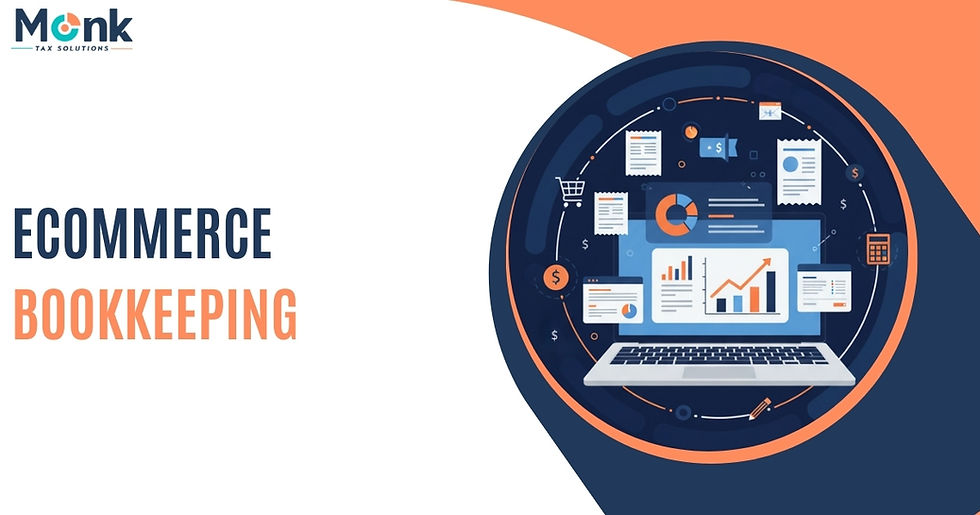Find the Right Ecommerce Bookkeeper and Save Time & Money
- abbottsteve952
- Sep 17, 2025
- 3 min read

Running an ecommerce business can be exciting, but managing finances often feels overwhelming. From tracking sales across multiple platforms to reconciling payments and handling taxes, the bookkeeping tasks can pile up fast. That’s why mastering ecommerce bookkeeping and knowing how to hire the right ecommerce bookkeeper is essential for the success of your online business.
In this article, we’ll walk you through practical tips, what to look for in a bookkeeper, and tools to make your ecommerce bookkeeping easier and more efficient.
Understand Your Ecommerce Bookkeeping Needs
Before you start searching for a bookkeeper, it’s crucial to understand your business’s specific accounting needs. Not all bookkeepers are familiar with the unique challenges of ecommerce.
Some key considerations include:
Multiple Sales Channels: Are you selling on Shopify, Amazon, Etsy, or your own website? Each platform may have different reporting formats.
Inventory Management: Ecommerce businesses often need help tracking inventory costs and reconciling them with sales.
Payment Processors: Payment gateways like PayPal, Stripe, and Square require careful tracking to ensure your cash flow matches your books.
Sales Tax Compliance: Online sales often involve different state and international tax rules. Knowing your obligations is critical.
By understanding your needs, you can clearly communicate them to potential bookkeepers and find someone who is experienced in handling ecommerce-specific financial tasks.
Qualities to Look for in an Ecommerce Bookkeeper
Hiring the right bookkeeper is about more than just experience. Look for these qualities to ensure you’re making the right choice:
E-commerce Expertise: The bookkeeper should have experience with online businesses and familiarity with platforms like Shopify, WooCommerce, or Amazon.
Attention to Detail: Mistakes in bookkeeping can lead to incorrect tax filings and financial confusion. Precision matters.
Organisational Skills: They should be able to manage multiple accounts, invoices, and reports efficiently.
Communication Skills: Your bookkeeper should explain financial data in a way you understand.
Tech-Savvy: Comfort with bookkeeping software and automation tools is essential for streamlining processes.
Real-Life Example: One Shopify store owner saved over 20 hours per month by hiring a bookkeeper who set up automated bank reconciliations, freeing up time to focus on marketing and product growth.
Interviewing Candidates: Ask the Right Questions
Once you’ve identified potential candidates, the next step is to interview them. Ask questions that reveal both experience and approach:
Experience with E-commerce: “Have you managed bookkeeping for online stores? Which platforms have you worked with?”
Knowledge of Tax Laws: “How do you handle sales tax compliance for multiple states or countries?”
Software Proficiency: “Which accounting tools do you use for ecommerce bookkeeping, and why?”
Problem-Solving Skills: “Can you describe a time you resolved a financial discrepancy or optimized a bookkeeping process?”
Communication Style: “How do you report financial updates to business owners who aren’t familiar with accounting terms?”
Pay attention not only to their answers but also to how clearly they explain complex topics. A good bookkeeper should make your financials understandable and actionable.
Tools and Software for Ecommerce Bookkeeping
Technology can significantly simplify ecommerce bookkeeping. Here are some popular tools that both business owners and bookkeepers use:
QuickBooks Online: Widely used for its ecommerce integrations and robust reporting capabilities.
Xero: Cloud-based accounting software suitable for small to medium-sized ecommerce businesses.
A2X: Ideal for Amazon and Shopify sellers to automate revenue and fee reporting.
Shoeboxed or Expensify: Helps manage receipts, expenses, and invoices efficiently.
Inventory Management Tools: Software like TradeGecko or Zoho Inventory integrates with bookkeeping systems to track inventory costs and sales.
Integrating these tools with your bookkeeping process reduces errors, saves time, and provides better visibility into your business’s financial health.
Conclusion
Efficient bookkeeping is the backbone of a successful ecommerce business. By understanding your needs, identifying the right qualities in a bookkeeper, asking the right questions, and leveraging modern tools, you can ensure your finances are accurate, compliant, and easy to manage.
Hiring the right ecommerce bookkeeper is not just about keeping records—it’s about creating a foundation for growth, making informed business decisions, and freeing up your time to focus on what you do best: selling products and growing your brand.




Comments